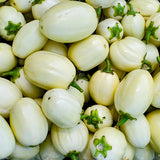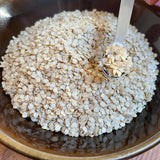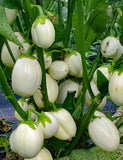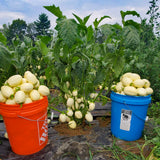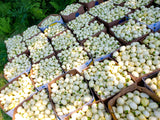Intore (African Eggplant)
Solanum aethiopicum
Please note: this listing is for SEEDS, not fresh eggplants! If you are interested in fresh Intore eggplants as produce, please email us and we will put you in touch with our grower, Janine Ndagijimana for purchasing.
This is an oblong, lobed, white garden egg from Africa that is particularly large and more productive, especially in shorter seasons like northern Vermont where Janine Ndagijimana lives and farms. Janine's family is from Burundi but she was born in Rwanda in a refugee camp. She now grows acres of this eggplant in order to ship thousands of pounds of fresh fruits to Africans throughout the US, and now she also shares the seeds through our catalog.
People like to eat this eggplant for its health benefits and to replace meat in various dishes. They are mixed with beans and veggies, mixed with fish and oil, fried and eaten with sauce, simply boiled, and even eaten fresh like an apple.
To learn more about Janine's eggplant farming story, see these articles:
"African refugee grows homeland's bitter eggplants in Vermont" - Taiwan News
"This Refugee Is Growing African Eggplants in the US to Support Her Family" - Global Citizen
Days to maturity: 60 days after transplanting
Seeds per pack: 50-60
Seeds per bulk packet: approx. 500
Germination rate: 99% on 01/17/2025
Planting / harvesting notes
These are heat-loving and seeds should be started indoors about 1/4 inches deep, about 8 weeks before the last frost. Transplant into the garden well after the danger of frost. The growing characteristics are similar to most eggplants. The plants reach about 4-5 feet tall and should be planted 12 inches apart. They need full sun and fertile soil. Staking helps as the plants become heavy. The eggplants begin green, but should be picked when they are about 3 inches long and white (and before they turn orange!) They must be picked regularly to keep production and ensure they don't over ripen. For seed saving the fruits ripen to orange.
Seed keeping notes
Eggplants are generally self-pollinating, though we isolate different varieties of the same species by 300 feet, in hopes that flying insects will not cross pollinate them unexpectedly. Eggplant seeds are ripe when the fruits get far past their edible stage, and have turned another color, in this case orange. Cut the fruit, scrape out seeds (perhaps through a heavy-duty screen) into a vessel, add a little water (1-2" is probably plenty) to your seeds and pulp to keep them from drying out, and allow them to ferment away from direct sunlight. Fermentation is not necessary with eggplants, but it makes seed cleaning a bit easier. Ideally, you will stir the concoction every day for 3-5 days. In the end, add more water to fill the vessel, stir one final time, and allow the seeds to settle. Pour off the floating material and then strain the seeds through a strainer. Sometimes, you will need to add more water and pour off the floating material several times until the water is clear and you can see the seeds sunken at the bottom. Squeeze dry the strained seeds in a towel, and then lay out to dry on a labeled screen or paper product in a ventilated place away from direct sunlight for a week or two.






